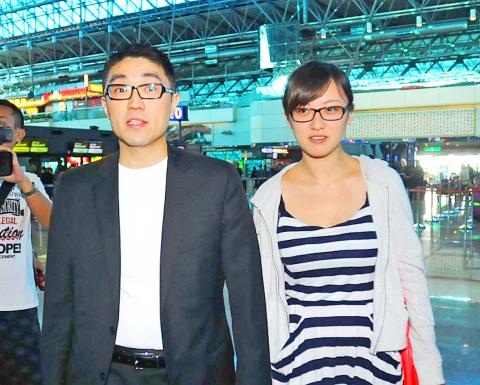Chinese Nationalist Party (KMT) Legislator Hsieh Kuo-liang (謝國樑) turned down a nomination offer from the party and President Ma Ying-jeou (馬英九), who doubles as KMT chairman, to run in Keelung’s mayoral election, citing objections from his family.
The KMT has been looking for a replacement for Keelung City Council Speaker Huang Ching-tai (黃景泰), whose nomination was withdrawn by the party on Wednesday in relation to corruption allegations and tanking public support.
Hsieh was at the top of the party’s replacement list.

Photo: CNA
The legislator has been asserting his unwillingness to run for office and formally rejected the offer after meeting the president on Thursday night.
“My family and my parents are all against the idea. So I have to say sorry to President Ma. However, I will certainly do my job for the party’s election campaign in Keelung,” he said at Taipei Taoyuan International Airport yesterday.
The legislator left the nation yesterday morning for a 10-day trip to Europe.
In a telephone interview with News 98 radio show host Clara Chou (周玉蔻) prior to his departure, Hsieh was asked whether his relationship with the party would be at risk if he refused the nomination, which could negatively affect his nomination next year for legislator.
The three-term legislator said he “does not view [the legislator nomination] that seriously,” adding that if he has the chance, he would continue to serve as a representative, but if not, “I would be OK with changing my career, too.”
Reportedly, Hsieh’s family background figured in the KMT’s decisionmaking process for replacing Huang.
The Hsiehs, who own the Sangong Group (三功集團) and local businesses such as the Second Credit Cooperative of Keelung and educational institutions such as Keelung ErXin High School, are a prominent family in the city.
Both Hsieh’s father and grandfather were Keelung councilors and provincial councilors — during the time when the Taiwan Provincial Government was still functioning — and his grandfather had once run for mayor.

Taiwan is stepping up plans to create self-sufficient supply chains for combat drones and increase foreign orders from the US to counter China’s numerical superiority, a defense official said on Saturday. Commenting on condition of anonymity, the official said the nation’s armed forces are in agreement with US Admiral Samuel Paparo’s assessment that Taiwan’s military must be prepared to turn the nation’s waters into a “hellscape” for the Chinese People’s Liberation Army (PLA). Paparo, the commander of the US Indo-Pacific Command, reiterated the concept during a Congressional hearing in Washington on Wednesday. He first coined the term in a security conference last

A magnitude 4.3 earthquake struck eastern Taiwan's Hualien County at 8:31am today, according to the Central Weather Administration (CWA). The epicenter of the temblor was located in Hualien County, about 70.3 kilometers south southwest of Hualien County Hall, at a depth of 23.2km, according to the administration. There were no immediate reports of damage resulting from the quake. The earthquake's intensity, which gauges the actual effect of a temblor, was highest in Taitung County, where it measured 3 on Taiwan's 7-tier intensity scale. The quake also measured an intensity of 2 in Hualien and Nantou counties, the CWA said.

The Overseas Community Affairs Council (OCAC) yesterday announced a fundraising campaign to support survivors of the magnitude 7.7 earthquake that struck Myanmar on March 28, with two prayer events scheduled in Taipei and Taichung later this week. “While initial rescue operations have concluded [in Myanmar], many survivors are now facing increasingly difficult living conditions,” OCAC Minister Hsu Chia-ching (徐佳青) told a news conference in Taipei. The fundraising campaign, which runs through May 31, is focused on supporting the reconstruction of damaged overseas compatriot schools, assisting students from Myanmar in Taiwan, and providing essential items, such as drinking water, food and medical supplies,

New Party Deputy Secretary-General You Chih-pin (游智彬) this morning went to the National Immigration Agency (NIA) to “turn himself in” after being notified that he had failed to provide proof of having renounced his Chinese household registration. He was one of more than 10,000 naturalized Taiwanese citizens from China who were informed by the NIA that their Taiwanese citizenship might be revoked if they fail to provide the proof in three months, people familiar with the matter said. You said he has proof that he had renounced his Chinese household registration and demanded the NIA provide proof that he still had Chinese